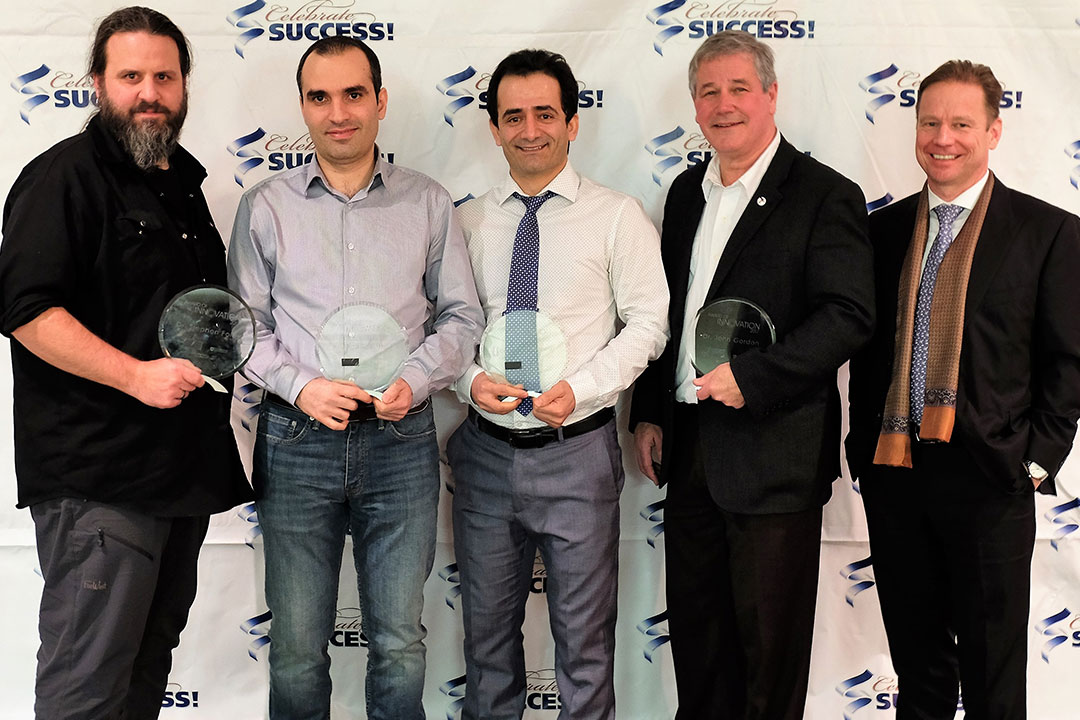
U of S researchers honoured for ground-breaking inventions
SASKATOON – Four University of Saskatchewan (U of S) researchers were honoured with the 2017 Award of Innovation at the 2017 SABEX Awards on Feb. 9 at Prairieland Park for innovations that will improve human health and the environment.
SASKATOON – Four University of Saskatchewan (U of S) researchers were honoured with the 2017 Award of Innovation at the 2017 SABEX Awards on Feb. 9 at Prairieland Park for innovations that will improve human health and the environment.
The winners of this $5,000 award were recognized for their innovative research achievements and the potential commercial impact of their discoveries.
Stephen Foley, associate professor of chemistry, and his PhD students Hiwa Salimi and Loghman Moradi, won the award for developing a new process for selectively removing gold from electronic waste, such as printed circuit boards. This is the fastest method known for leaching gold into solution, and is also selective for gold and requires no energy input. The reagents used are cheap, recyclable, and environmentally benign.
A company has been formed to operate a pilot plant in Saskatoon which will begin processing 500 kilograms of printed circuit boards a day within a few months. Even at this level of operation, the plant will be profitable and producing revenue from the start. Once this pilot facility is operational, the process can be replicated at sites around the world.
Meanwhile, John Gordon, a respirology professor, has discovered a way to essentially reverse the hyper-immune response in allergic reactions. This same treatment also appears, in mouse models, to apply to autoimmune diseases such as multiple sclerosis.
Gordon explains that some molecules naturally found in the body are known to skew local cells so that they turn off immune responses, instead of activating them. For instance, vitamin A in the gut is partially responsible for the body’s tolerance (as opposed to allergic response) to food allergens. The researchers have found that if they skew cells in this way in the test tube, they can subsequently return those cells to the individual from which they came and thereby turn off harmful responses—essentially ‘curing’ asthma or peanut allergies by use of these cells.
This discovery could lead to better disease management in patients with food allergies and asthma. Since this technology could potentially be applied to a wide range of autoimmune diseases, it could greatly improve the quality of life of many people. Funding for clinical trials is currently being sought.
“We were very excited by the quality of the nominations for this year’s Awards of Innovation, and it was extremely difficult to select a winner,” said Johannes Dyring, managing director of U of S Innovation Enterprise. “These inventions will have significant impact on our society. Innovation Enterprise will ensure that discoveries like these are enabled and supported to reach their potential.”
He noted that knowledge, technologies and innovations generated by the U of S enable the university to “play a critical role in realizing a vast spectrum of new opportunities for sustainable growth, social welfare and economic stability.”
Innovation Enterprise (formerly the Industry Liaison Office) fosters an entrepreneurial culture at the U of S and actively participates in and contributes to the successful achievement of the university’s goals of diversity, connectivity and sustainability. Innovation Enterprise is part of the U of S Office of the Vice-President of Research.
For more information, visit: http://research.usask.ca/innovation-enterprise/
-30-
For more information, contact:
Johannes Dyring
Managing Director
U of S Innovation Enterprise
306-966-7829
johannes.dyring@usask.ca
www.research.usask.ca/ie

